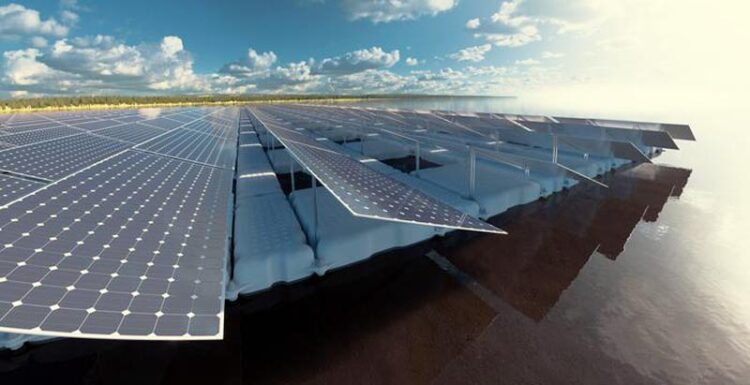Floating solar’s potential

Floating solar’s potential to support sustainable development in Africa by addressing climate, water, and energy goals holistically
Credit: Politecnico di Milano
… to support sustainable development by addressing climate, water, and energy goals holistically.
A new study published this week in Nature Energy raises the potential for floating solar photovoltaics (FPV) to supplant planned hydropower in meeting Africa’s energy goals.
The study, published in Nature Energy, is among the first to explore the FPV at the continental scale, finding that FPV installed at existing major reservoirs could produce 20-100% of the electricity expected from Africa’s planned hydropower dams. Using a state-of-the-art energy planning model covering the continent’s entire energy system, the researchers found that FPV is cost-competitive with other renewables and thus a key part of Africa’s future energy mix.
“Floating solar is fast becoming cost-competitive with land-based solar, and our results suggest it could conceivably avoid the need to build many of the dams planned for hydropower across Africa,” said lead author Wyatt Arnold. “This would allow nations to meet future electricity demands while sidestepping the damaging environmental and social impacts of large dams.”
The researchers conducted a detailed case study on the transboundary Zambezi watercourse, finding that the capital investment slated for new dam projects could be deployed more efficiently by building fewer reservoirs and supplementing the energy supply with floating solar. Compared to dam-intensive solutions, this approach yielded 12% less interannual variability in electricity supply and proved more robust against potential long-term drought conditions exacerbated by climate change.
“By embracing floating solar and reducing the reliance on hydropower, developing economies can ensure a more stable energy supply that is robust to hydrological uncertainties brought about by climate change,” said Prof. Andrea Castelletti. “Moreover, floating solar avoids many of the negative impacts new dams may have on downstream communities and river ecosystems.”
The authors emphasize that the work highlights the importance of integrated resource planning and considering transboundary impacts when navigating sustainable development pathways. Traditional energy-water modeling often looks at single sectors like hydropower in isolation. However, this study showcases advanced multisector modeling that can reveal and balance tradeoffs across energy, agriculture, environmental protection, and economic development objectives within transboundary river basins.
“Our findings suggest the benefits of avoiding new dams through strategic floating solar deployments could outweigh the potential impacts on existing reservoir uses like fishing or recreation,” said Prof. Matteo Giuliani, “but a collective effort is still needed to continue improving FPV technology and ensure its responsible deployment through robust integrated planning and stakeholder engagement processes.”
While the environmental case for FPV is compelling, the authors acknowledge technical and social factors that may constrain its adoption at certain sites. However, they argue these potential impacts would be far less severe than those of new hydropower dam construction and reservoirs that can irreversibly disrupt river ecology, displace communities, and exacerbate regional tensions over shared water resources.
Journal: Nature Energy
DOI: 10.5281/zenodo.10576226
Method of Research: Data/statistical analysis
Subject of Research: Not applicable
Article Title: Floating photovoltaics may reduce the risk of hydro-dominated energy development in Africa
Article Publication Date: 12-Apr-2024
Media Contact
Francesca Pierangeli
Politecnico di Milano
relazionimedia@polimi.it
Office: +390223992441
Cell: +393666211435
Original Source
All latest news from the category: Power and Electrical Engineering
This topic covers issues related to energy generation, conversion, transportation and consumption and how the industry is addressing the challenge of energy efficiency in general.
innovations-report provides in-depth and informative reports and articles on subjects ranging from wind energy, fuel cell technology, solar energy, geothermal energy, petroleum, gas, nuclear engineering, alternative energy and energy efficiency to fusion, hydrogen and superconductor technologies.
Newest articles

First-of-its-kind study uses remote sensing to monitor plastic debris in rivers and lakes
Remote sensing creates a cost-effective solution to monitoring plastic pollution. A first-of-its-kind study from researchers at the University of Minnesota Twin Cities shows how remote sensing can help monitor and…

Laser-based artificial neuron mimics nerve cell functions at lightning speed
With a processing speed a billion times faster than nature, chip-based laser neuron could help advance AI tasks such as pattern recognition and sequence prediction. Researchers have developed a laser-based…

Optimising the processing of plastic waste
Just one look in the yellow bin reveals a colourful jumble of different types of plastic. However, the purer and more uniform plastic waste is, the easier it is to…



